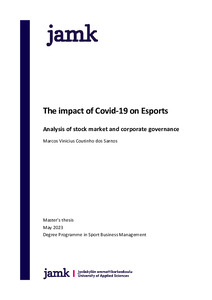The impact of Covid-19 on Esports – Analysis of stock market and corporate governance
dos Santos, Marcos (2023)
dos Santos, Marcos
2023
Julkaisun pysyvä osoite on
https://urn.fi/URN:NBN:fi:amk-2023061624083
https://urn.fi/URN:NBN:fi:amk-2023061624083
Tiivistelmä
Along with the multibillion video game industry, the burgeoning phenomenon of electronic sports aka Esports has been drawing attention from investors worldwide. Besides its vibrant online communities, Esports’ rapidly growing revenue and audience have also been pulling in crowds to onsite tournaments hosted in custom-made Esports arenas until Covid-19 outbreak halted the scene in 2020.
Socioeconomic repercussions were felt globally raising investors’ apprehension. Unprecedented stock market reaction caused an overall stock market plunge. The study proceeds with a brief literature review on the stock market dynamics, stocks performance during Covid-19 and the video gaming industry’s evolution aiming for theoretical grounding on the Esports’ ecosystem. The review is followed by stock market data gathering of the Astralis, OverActive media and Guild Esports, the sole business of which is owning and managing Esports teams during the Covid-19 period up to present time (January 2020 – April 2023).
Quantitively, daily stock market performance was examined and for each Esports' stock were calculated five stock indicators such as Return, Risk, Beta, systematic and unsystematic. The Capital Asset Pricing Model (CAPM) was used to determine the behavior of the assets based on their risk and return. According to the analysis, the rate of return indices for the chosen Esports stocks over the Covid-19 period were not uniform and there are dissimilarities between their realized average rate of return though the organizations belong to the same industry and share similarities.
Despite the downward of their stocks and revenue loss, their betas coefficient was in the risk-averse zone and new sponsoring agreements, business expansion and new revenue sources took place. A few changes in the management have occurred in the past three years, though only OverActive experienced abrupt change in the CEO, no other significant actions from the board of directors of the investigated firms were observed. Certain level of realistic optimism amid Covid-19 in their annual reports as well as overall good level of transparency in the governance and their relationship with stakeholders is noticeable.
Socioeconomic repercussions were felt globally raising investors’ apprehension. Unprecedented stock market reaction caused an overall stock market plunge. The study proceeds with a brief literature review on the stock market dynamics, stocks performance during Covid-19 and the video gaming industry’s evolution aiming for theoretical grounding on the Esports’ ecosystem. The review is followed by stock market data gathering of the Astralis, OverActive media and Guild Esports, the sole business of which is owning and managing Esports teams during the Covid-19 period up to present time (January 2020 – April 2023).
Quantitively, daily stock market performance was examined and for each Esports' stock were calculated five stock indicators such as Return, Risk, Beta, systematic and unsystematic. The Capital Asset Pricing Model (CAPM) was used to determine the behavior of the assets based on their risk and return. According to the analysis, the rate of return indices for the chosen Esports stocks over the Covid-19 period were not uniform and there are dissimilarities between their realized average rate of return though the organizations belong to the same industry and share similarities.
Despite the downward of their stocks and revenue loss, their betas coefficient was in the risk-averse zone and new sponsoring agreements, business expansion and new revenue sources took place. A few changes in the management have occurred in the past three years, though only OverActive experienced abrupt change in the CEO, no other significant actions from the board of directors of the investigated firms were observed. Certain level of realistic optimism amid Covid-19 in their annual reports as well as overall good level of transparency in the governance and their relationship with stakeholders is noticeable.
